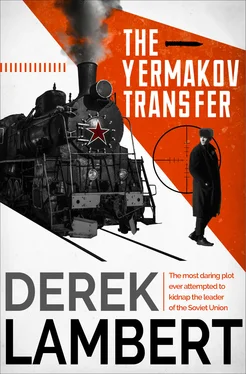In a small compartment at the rear of the special coach a K.G.B. colonel and two junior officers occupied themselves with their own statistics: the records of every passenger and crew member. The colonel had marked red crosses against fourteen names; each of those fourteen was accompanied in his compartment by a K.G.B. agent. As the last outposts of Moscow fled past the window the colonel, whose career and life were at stake, stood up, stretched and addressed his two subordinates. “Now check out the whole train again. Every compartment, every lavatory, every passenger.”
The officers walked respectively past Yermakov who stared at them closely, communicating apprehension which made them feel a little sick. He had just remembered that, in the old days, it was considered unlucky to travel on the Trans-Siberian on a Monday.
FIRST LEG
CHAPTER 1
The kidnap plot was first conceived by Viktor Pavlov in Room 48 of the Leningrad City Court at Fontanka on December 24, 1970.
On that day two Jews were sentenced to death and nine to long terms of imprisonment for attempting to hi-jack a twelve-seater AN-2 aircraft at Priozersk airport and fly it to Sweden en route to Israel.
At the back of the courtroom, which seated 200, Pavlov listened contemptuously to the details of the botched-up scheme. When he heard the evidence of one of the accused, Mendel Bodnya, revulsion burned inside him like acid.
Bodnya told the court that he had yielded to hostile influence and deeply regretted his mistake. He thanked the authorities for opening his eyes: he had only wanted to go to Israel to see his mother.
Bodnya got the lightest sentence: four years of camps with intensified regime, with confiscation of property.
Pavlov’s contempt for the other amateurs was tempered by admiration for their brave, hopeless idealism.
The woman Silva Zalmanson in her final statement: “Even now I do not doubt for a minute that some time I shall go after all and that I will live in Israel.… This dream, illuminated by two-thousand years of hope, will never leave me.”
Anatoly Altman: “Today, on the day when my fate is being decided, I feel wonderful and very sad: it is my hope that peace will come to Israel. I send my greetings today, my land. Shalom Aleikhem! Peace unto you, Land of Israel.”
When the sentences were announced Pavlov joined the disciplined applause because he had cultivated the best cover there was – anti-Semitism. A woman relative of one of the defendants rounded on him: “Why applaud death?” He ignored her, controlling his emotion as he had controlled it so often before. He was a professional.
He watched impersonally as the relatives climbed on to the benches weeping and shouting. “Children, we shall be waiting for you in Israel. All the Jews are with you. The world is with you. Together we build our Jewish home. Am Yisroel khay.”
With tears trickling down his cheeks an old man began to sing “Shma Yisroel”. The other relatives joined in, then some of the prisoners.
Viktor Pavlov sang it too, silently, with distilled feeling, while he continued to applaud the sentences. Then the local Party secretary who had collected the obedient spectators realised that the hand-clapping had become part of the Zionist emotion. Guiltily, he snapped, “Cease applause.” Another amateur, Pavlov thought as he stopped clapping: each side had its share of them: the knowledge was encouraging.
At 11 a.m. on December 30, at the Moscow Supreme Court, after a sustained campaign of protest all over the world, the two death sentences were commuted to long sentences in strict regime camps and the sentences on three other defendants reduced.
While the Collegium of the Supreme Court was deliberating the appeals Pavlov waited outside noting the identity of a couple of demonstrators. With their permission he would later identify them to the K.G.B. at their Lubyanka headquarters opposite the toy store. They would be locked up for a couple of weeks for hooliganism and his cover would be strengthened.
The Jewish poet, Iosif Kerler, was giving interviews to foreign correspondents. The Leningrad verdict, he told them, was a sentence on every Jew trying to get an exit visa for Israel. But Pavlov knew there was no point in laying information against Kerler: the police had a dossier on him and there was nothing poetic about it. Nor was there any point in informing on the Jewess from Kiev who was telling correspondents about her son dying in Jerusalem: the K.G.B. had her number, too.
No, the information had to be new and comparatively harmless. Pavlov had an arrangement with a Jewish schoolteacher who didn’t mind a two-week stretch during the school holidays. He wore a piece of white cloth pinned to his lapel bearing in Hebrew the slogan NO TO DEATH with a yellow, six-pointed Star of David beneath it. He meant well but he was over-playing his hand; it was like laying information against a man walking across Red Square with a smoking bomb in his hand. A pretty Jewess had also agreed to serve a statutory two-week sentence. Pavlov would report that she had been chanting provocative Zionist slogans; although she had been doing nothing of the sort because, like Pavlov, she had little time for pleas and protests; Israel was strength and you didn’t seek entry with a whine. Pavlov stared at her across the crowd; she stared back without recognition; she, too, was a professional.
Among the correspondents Pavlov noticed the American Harry Bridges. Tall, languid, watchful. He had the air of a man who had the story sewn-up. He didn’t bother interviewing the demonstrators and managed to patronise the other journalists. Pavlov admired him for that; at the same time he hoped he would rot in hell.
When the success of the appeals was announced the demonstrators sang and shouted their relief. Viktor Pavlov felt no relief; now the amateurs had even lost their martyrdom. They had perpetrated an abortion: he was conceiving a birth.
* * *
Viktor Pavlov belonged to that most virulent strain of revolutionaries: those who don’t wholly belong to the cause they are fighting for. He was fighting for Soviet Jewry and he was only part Jewish.
Sometimes his motives scared him. Why, when so many full-blooded Jews advised “Caution, caution” did he, a mongrel, call for “Action, action”? What worried him most was the sincerity of his conviction. Was the scheming and inevitable brutality merely a heritage? – a family tree planted in violence? And the right of the Jews to emigrate to Israel: Was that merely a facile cause?
Passionately, Viktor Pavlov sought justification. He found it mostly in the richness of his Jewish strain of blood. So deeply did he feel it that it sometimes seemed to him that it had a different course to his gentile blood.
His great, great grandparents had been Jews born in the vast Pale of Settlement in European Russia where the Tsars confined the Jews. After the murder of Alexander II the Jews became scapegoats and Pavlov’s ancestors were exiled to Siberia to one of the mines which produced 3,600 pounds of gold loot a year for Alexander III.
The persecution of the Jews continued and Viktor Pavlov found deep, bitter satisfaction in its history. Scapegoats; they were always the scapegoats. In 1905 gangs like the Black Hundreds carried out hundreds of pogroms to distract attention from Russia’s defeat – its debacle – at the hands of the Japanese. Followed in 1911 by the Beilis Case when a Jew in Kiev was accused, and subsequently acquitted, of the ritualistic murder of a child.
By this time the Jewish blood that was to flow in Viktor Pavlov’s veins had been thinned. His grandmother, Katia, married a gentile, an ex-convict who helped to build the Great Siberian Railway and became a gold baron in the wild-east town of Irkutsk.
Читать дальше












